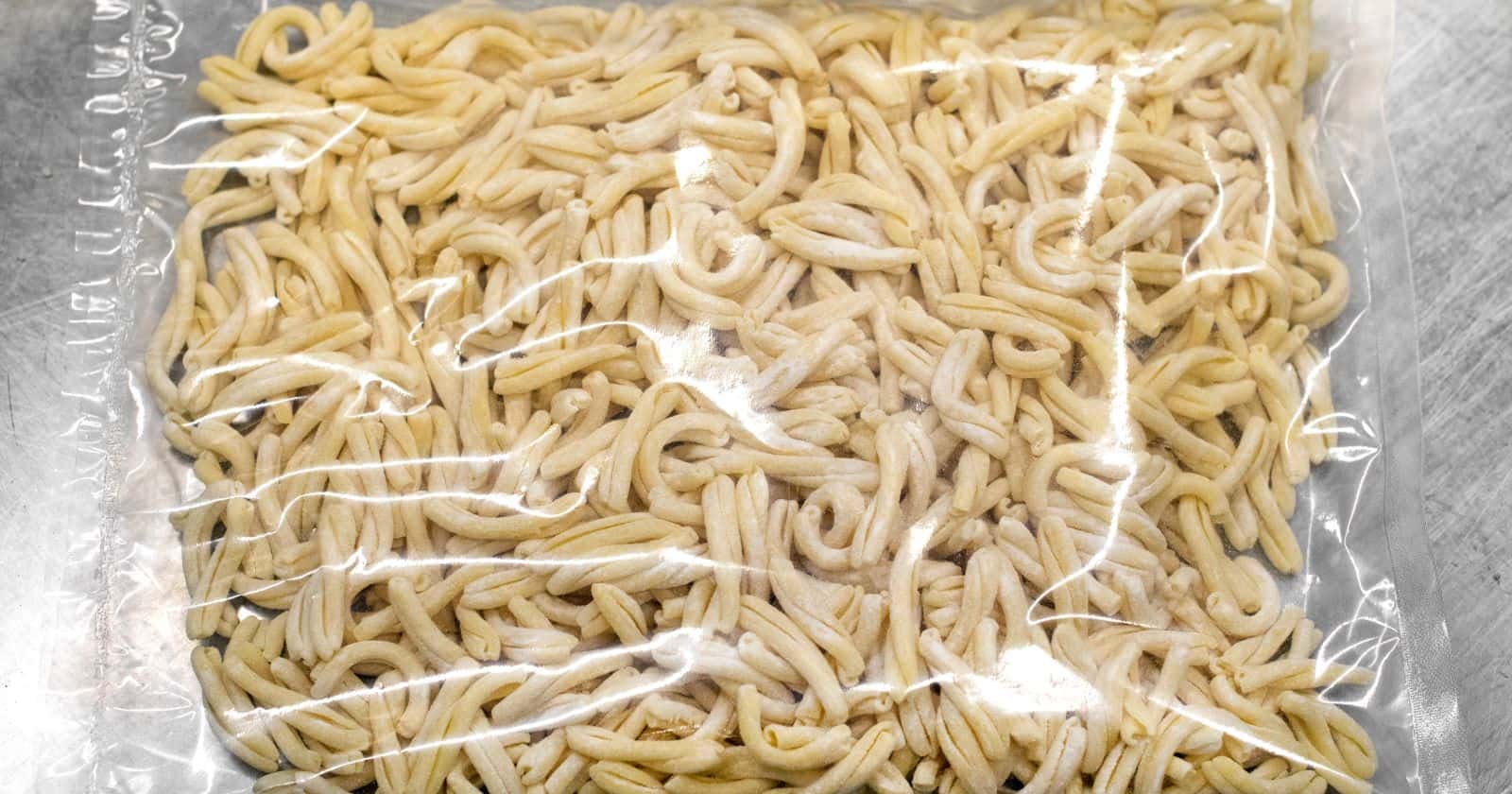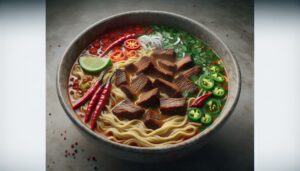Ramen noodles are a staple in many households thanks to their convenience, affordability, and long shelf life. But can these inexpensive instant noodles still be safely eaten after they pass their printed expiration date?
The short answer is yes, you can likely eat expired ramen noodles without getting sick, especially if the package is still sealed. However, the risk of foodborne illness increases the longer the noodles sit on your shelf past their best-by date.
While the noodles may not make you violently ill if you eat them a few months after the expiration date, the taste, texture, and nutritional value of the noodles will deteriorate over time. Consuming very old ramen two or more years past its date comes with much higher risks of contamination.
So how do you know if your package of instant ramen is still safe to eat? Should you throw them out at the first sign of staleness? Here’s what you need to know about determining if your expired ramen has gone bad and when it’s best to just toss it.
The rest of the article provides more details on…
Do Ramen Noodles Expire?
Yes, ramen noodles do expire eventually. But with their preservatives and dry packaging, they last significantly longer than other foods.
Unopened ramen can last 1-2 years past the printed expiration date. Once opened, it’s best to use ramen noodles within 6 months.
The durability comes from:
- Drying process that removes moisture where bacteria grows
- Added preservatives like salt, MSG, and sodium carbonate
- Airtight packaging that prevents oxygen exposure
So as long as the packaging remains intact, ramen has an impressively long shelf life compared to other foods. But it doesn’t last forever.
Can You Eat Expired Instant Noodles?
You’re rummaging through the pantry and find an old, expired package of ramen. Should you still whip up a bowl?
Eating expired instant noodles won’t necessarily make you sick, but risks increase with time. Here are some general guidelines on consuming expired ramen:
- Within 3 months past expiration: Very low risk of foodborne illness. Quality and taste start declining.
- 3-6 months past date: Low risk if stored properly. Noticeable stale texture and dull flavor.
- 6-12 months past date: Moderate risk. Higher chance of rancidity and spoilage. Discoloration or smell.
- Over 1 year expired: High risk of contamination. Mold, bacteria growth likely. Do not eat noodles this old.
Trust your senses. If expired noodles have an off smell, color, or mushy texture, it’s safest to discard them. Sliminess, stickiness, or dry crustiness also indicates spoilage.
When unsure, remember – “When in doubt, throw it out!”
How Long Can You Eat Instant Noodles After Expiration?
As a general rule of thumb, consume instant noodles within:
- Unopened: 2 years past printed expiration date
- Opened: 6 months after opening
However, other signs of spoilage trump these timelines. Discard noodles if you notice:
- Slimy or sticky texture
- Strange odor
- Discoloration
- Mold
- Rancid taste
- Bug infestation
Freezing can extend shelf life by a few months since cold temperatures slow bacteria growth. But freezing won’t reverse the staling process.
Ultimately, your nose and eyes know best! Rely on them, not the calendar, to decide when opened ramen is done.
Signs Ramen Noodles Have Gone Bad
Watch for these cues that signal expired ramen noodles:
Slimy or Mushy Texture
A gummy, sticky, or soggy texture means bacteria has created a welcoming home in your noodles. Toss them out!
Strange Smell
Give those noodles a big sniff before cooking. A sour, rancid, or ammonia-like odor screams spoilage.
Discoloration
Look for grayish, yellowish, or brownish tinting. Natural fading of color over time is normal but dramatic changes in hue can indicate mold or oxidation.
Living Organisms
Tiny worms or bug larvae, along with mold or mildew growth, are obvious red flags. Their presence means bacteria is actively breaking down noodles.
Taste Test
If appearance passes, take a small taste of the raw noodles. Rancid or bitter flavors mean it’s time to say goodbye.
Health Risks of Eating Expired Ramen
Eating expired ramen comes with certain health risks to be aware of:
Foodborne Illness
Out-of-date noodles can harbor dangerous levels of bacteria like Bacillus cereus, Staphylococcus aureus, and various molds. These can cause nasty food poisoning symptoms.
Digestive Upset
Milder stomach issues like diarrhea, vomiting, and nausea may result from eating ramen past its prime.
Allergic Reaction
Spoiled foods are more likely to cause allergic reactions in some people, especially mold allergies.
Nutritional Loss
Over time, expired ramen loses its vitamin and mineral content. Eating it as a meal denies you proper nutrition.
Toxins
Ramen sitting too long can breed toxins like mycotoxins or BPA from packaging. Consuming these toxins poses various health risks.
When unsure of ramen’s safety, you’re better off tossing it and making a fresh, risk-free meal. Your body will thank you.
How To Tell If Dry Ramen Noodles Are Bad
Dry ramen lasts longer than pre-made fresh noodles. But opened packages still require inspection. Here’s how to spot spoiled dry ramen:
- Crunchy or floury texture instead of brittle
- Faded, dull color
- Cardboard-like taste
- Visible mold, webbing, or bugs
- Strong bitter or sour smell
- Clumping from moisture absorption
Trust your senses. If the noodles seem stale, musty, or rancid in any way, it’s safest to let them go.
Can You Eat 2 Year Old Ramen Noodles?
Eating 2-year old ramen brings high risks of foodborne illness. Noodles this old are more likely to contain dangerous mold, bacteria, and toxins.
Two exceptions:
- Ramen stays in continual climate-controlled conditions.
- If packaged for long term storage with oxygen absorbers, nitrogen flush, and other preservation techniques. Think a #10 can of ramen for preppers.
For average pantry or cupboard storage, consume ramen within 1 year for safety. Discard anything older, even if unopened. Not worth the gamble!
Tips For Safely Consuming Ramen Noodles
To enjoy ramen and minimize foodborne illness risks:
- Inspect packaging for damage before buying
- Check and adhere to expiration dates
- Store sealed ramen in a cool, dry place
- Open and reseal tightly after use
- Refrigerate opened pouches and use within 3 days
- Look for off smells, textures, or appearance
- When doubtful, throw it out!
With proper handling and storage, ramen can safely stay tasty for some time past its date. Trust your senses, follow safety tips, and avoid eating ramen over 2 years old.
Can You Eat Ramen That Smells Bad?
No, you should never eat ramen that smells rancid or “off.” Strange odors typically signal spoilage and bacterial growth. Consuming these noodles puts you at high risk for food poisoning.
Some smells that indicate spoiled noodles:
- Sour, vinegary scent
- Rotten egg odor
- Fishy ammonia smell
- Moldy mustiness
- Powerful bitterness
Even one whiff means those noodles belong in the trash, not your body. The same goes for ramen with an apparent slimy or fuzzy texture.
When unsure, remember it’s better to waste some noodles than to risk getting sick. Your safety is more important than eating questionable ramen.
How To Store Ramen Noodles Properly
To maximize freshness, store ramen properly:
- Keep unopened ramen in a cool, dry pantry away from heat, moisture, and sunlight.
- After opening, transfer noodles to an airtight container or resealable bag.
- Refrigerate opened pouches for no more than 3 days.
- For long-term storage, consider freezing unopened ramen. Thaw overnight in the fridge before using.
- Ensure packaging is intact with no tears, holes, or crushed areas. Avoid if puffed up with air.
- Position so oldest noodles get used first. Keep track of purchase dates.
- Store ramen off the floor on shelves or in cabinets.
With the right storage conditions, ramen can safely last for some time past its expiration date. But remember to rely on sight and smell – not just dates – to determine if ramen has spoiled.
Healthy Ramen Alternatives
The sodium, fat, and preservatives in instant ramen aren’t ideal for regular meals. For more nutritious noodle bowls, try these healthy options:
- Zucchini noodles or spiralized vegetables
- Rice noodles or glass noodles
- Soba or udon noodles
- Spaghetti squash
- Shirataki noodles
- Bean thread noodles
Amp up nutrition by loading up on vegetables, lean proteins like shrimp or chicken, broth made from scratch, and fresh herbs. Homemade broth simmered for hours makes all the difference in flavor too!
With the right ingredients and techniques, you can create noodle soup bowls that are truly good for you. Save the instant ramen for occasional convenience instead of regular meals.
The Takeaway on Expired Ramen Noodles
Ramen noodles last significantly longer than their expiration date if stored properly. But for maximum safety, it’s ideal to finish opened packages within 6 months.
Rely on your senses – if noodles smell funky or look slimy, err on the side of caution and throw them away. Consuming ramen over 2 years old comes with higher risks of foodborne illnesses.
For the healthiest meals, limit instant ramen and choose nutritious noodles and homemade broths instead. With smart storage and handling, ramen can stay tasty and safe long after the printed date.





